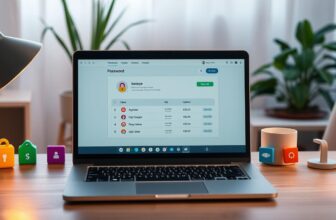Did you know using the Best VPN for Multiple Devices could save you up to 75% on online purchases and subscriptions? A VPN changes your virtual location. This helps you avoid price changes based on where you are or your browsing history. As digital protection becomes more essential, finding ways to save on the best VPNs for multiple devices is key in 2024.
This guide will show you how to cut costs on the best VPNs for multiple devices. We’ll cover family plans, discounts, and tips to keep your online privacy secure without overspending.
Key Takeaways
- Understanding price discrimination can lead to considerable savings on various online services.
- Choosing the right VPN plan is crucial for connecting multiple devices effectively.
- Discounts and promotions can significantly reduce your VPN expenses.
- A router configuration can help all your devices connect to a single VPN subscription.
- Price fluctuations in services can often be mitigated by changing your virtual location.
- Comparing subscription costs among top VPN providers is essential for finding the best deal.
Understanding VPNs and Their Benefits for Multiple Devices
A Virtual Private Network (VPN) acts like a secure tunnel. It protects your online actions by encrypting your data and hiding your IP address. This shows how VPNs boost online security. People choose VPNs for free internet and better privacy on any device.
What is a VPN?
A VPN makes a secure link between your device and the internet. It lets you browse privately and keep your data safe. Companies use VPNs to keep their networks safe from unauthorized access.
With strong 256-bit encryption, VPNs keep hackers from stealing your private info. This means your sensitive data stays safe.
Why Use a VPN for Multiple Devices?
VPNs offer more than just privacy. They are key for families with many devices. Using a VPN helps avoid slow internet speeds due to data limits.
It also lets you access blocked content by giving you a different IP address.
NordVPN supports up to six devices at once, while Surfshark lets you connect unlimited devices. This is great for families. It helps protect all family members’ devices and keeps them safe online.
How to Save on the Best VPN for Multiple Devices
Finding the right VPN plan is key to saving money and keeping many devices safe. Start by looking at different providers and see how many devices you can connect at once. Surfshark is great for families because it lets you connect all devices without limits. But, other VPNs only let you connect 5 to 10 devices, which might not be enough for big families.
Choosing the Right VPN Subscription Plan
Think about more than just how many devices you can connect. Features like kill switches keep your data safe if the VPN connection drops. Look for VPNs that offer great features at a good price. NordVPN, for example, has up to 75% off on some plans, making it a top choice.
Finding Discounts and Promotions
Deals can really affect your choice of VPN. Always check the websites of VPN providers or sign up for their newsletters for special offers. Some VPNs give discounts to new users or during sales. Using these deals can save you money and improve your online safety. Make sure to compare prices after discounts to get the best VPN value.
👉 Want all the best VPN deals in one place? Discover these VPN deals at CouponBre to find the latest discounts and offers from top providers. It’s an easy way to save more and get the best value for your money!
Best VPNs for Connecting Multiple Devices
Choosing the right VPN for many devices is key for families. It’s important to look for VPNs made for family use. These VPNs let you connect many devices at once, keeping everyone safe easily. Look for easy-to-use interfaces and strong security.
Features to Look for in a Family VPN
- Unlimited device connections: Many families have lots of devices, so this is a must-have.
- Easy management interface: A simple interface makes it easy for everyone to handle their connections.
- Strong security measures: Family VPNs should have top-notch encryption and privacy tools.
- Speed performance: Fast connections are key for streaming, gaming, or browsing together.
Top Recommended VPN Providers in 2024
After testing over 70 VPNs, these are the top picks:
| VPN Provider | Simultaneous Connections | Starting Price | Average Speed Drop | Money-Back Guarantee |
|---|---|---|---|---|
| ExpressVPN | 8 | $6.67/month | 12% with multiple devices | 30 days |
| Private Internet Access | Unlimited | $2.19/month | 20% with 15 devices | 30 days |
| CyberGhost | 7 | $2.75/month | 12% with 7 devices | 45 days |
| Surfshark | Unlimited | $2.19/month | — | 30 days |
| TunnelBear | Unlimited | $3.33/month | — | 30 days |
ExpressVPN supports up to 8 devices at once with a 12% speed drop. Private Internet Access lets you connect as many devices as you want, but speed may drop with more users. Surfshark and TunnelBear are great for families needing lots of connections. They offer good prices and strong security.
Using a VPN with Your Router
Setting up a VPN on your router has many benefits for online safety across all devices. It makes sure your internet is secure on every device at home. This way, you get to enjoy streaming and browsing safely on your phone, tablet, and computer.
Benefits of Router Configuration
- Comprehensive Protection: Router VPNs protect all devices like streaming sticks and smartphones.
- Convenience: It means all devices get encryption without extra setup.
- Support for Various Devices: It also secures devices that can’t use VPNs on their own.
- Streamlined Installation: Setting up a VPN on a router is easier and faster.
Step-by-Step Guide to Setting Up a VPN on Your Router
- Make sure your router works with VPN services. If not, you might need to buy a VPN-ready router.
- Open your router’s admin page in a web browser, usually found at a specific IP address.
- Put in your VPN account details and set up the VPN as needed.
- If your router needs updates, you can find instructions from VPN providers or the router maker.
- Remember to save the router settings so you can easily find them later.
Many routers like those from Asus, Netgear, Linksys, and TP-Link support VPN setups. This makes it easy to pick the right one for your needs. Using a VPN on your router boosts security and can even save you money by using one VPN for all devices.
| Router Type | Pros | Cons |
|---|---|---|
| ISP-Issued | Easy to set up, usually free | Has fewer features |
| Consumer Routers | More flexible, better security | May cost money, not always ready for VPN |
| Custom Firmware | Full control, best settings | Tough setup, could harm your router |
Learning how to set up a VPN on your router is key to keeping your internet safe at home. It ensures a secure internet experience on all your devices.
Maximizing Savings with VPN Alternatives
For those on a budget, looking at free VPN plans and low-cost alternatives is tempting. But, it’s key to know their limits and the downsides of free VPNs.
Free and Low-Cost VPN Options
Many VPN providers have different pricing plans. This lets users pick what they can afford. Free VPNs offer basic privacy, but they might have slower speeds and less data. Low-cost VPNs like NordVPN, Surfshark, and CyberGhost offer good value with strong features.
Limitations of Free VPN Services
Free VPNs have big drawbacks. They might log your data, which can hurt your privacy, and have security holes. You might also get slower speeds because of limited bandwidth. This can be a big problem for those who need fast, reliable connections for many devices.
It’s important to think about the small cost of a reliable paid VPN versus the problems with free ones. Knowing what you need and your budget will help you choose the right VPN.
| Type | Features | Drawbacks |
|---|---|---|
| Free VPN | Basic privacy, minimal cost | Data logging, slow speeds, limited support |
| Low-Cost VPN | Affordable plans, good performance | Occasional speed issues depending on plan |
| Paid VPN | Comprehensive features, high-speed connections | Higher cost than free or low-cost options |
Regular evaluation of VPN options can lead to significant savings over time.
Taking Advantage of Price Discrimination with a VPN
Understanding price discrimination is key for consumers wanting to save money. A VPN helps by letting users connect to servers in different places. This way, they can find better deals on flights and online subscriptions.
Buying Flights at Lower Prices
Airlines often change prices based on where you are, a thing called price discrimination. A study found that 42 out of 372 flight searches showed price changes due to browser cookies. Using a VPN lets people change their location to find cheaper flights. For example, flights might be less expensive from a VPN server in a country with lower prices, saving a lot of money.
Accessing Cheaper Online Services and Subscriptions
Prices for streaming services and subscriptions also vary by region. Netflix costs $5.27 in Germany but $6.99 in the U.S. Countries like Egypt, Pakistan, and Bolivia have cheaper Netflix plans. By picking a VPN location, users can get these cheaper deals.
Rental car prices also change by location. Using a VPN can save a lot of money; for example, Hertz was cheaper when set to Atlanta instead of Salt Lake City. This shows how changing your online location can save you money.
| Service | Price in US (USD) | Price in Germany (EUR) |
|---|---|---|
| Netflix (Cheapest Plan) | $6.99 | €5.27 |
| Amazon Prime Video | Varying (US) | Typically Cheaper (Brazil, Japan) |
Using a VPN helps consumers save money by taking advantage of price differences. With over 51% of internet users using VPNs for privacy, changing IP addresses is a smart way to find lower prices.
How to Protect All Your Devices Simultaneously
In today’s digital world, it’s key to keep all your devices safe online. Using a split tunneling VPN is a smart way to do this. It lets you control how your internet speed and keep all your devices safe at the same time.
This is great for families. It lets you pick which apps and devices use the VPN. So, you can watch a movie on your smart TV through the VPN but let your phone connect normally. This way, you get fast internet and keep your devices safe.
Services like Surfshark let you protect all your devices with one account. This means you can keep your whole family’s devices safe without any hassle.
Utilizing Split Tunneling Feature
The split tunneling feature lets you choose which apps and devices use the VPN. For example, you can stream a movie on your smart TV through the VPN. But, let your smartphone connect directly to the internet. This makes your internet faster and keeps your important devices safe.
Services like Surfshark offer unlimited connections at once, so your whole family can stay safe. This way, you get the best internet speed and keep your devices protected.
Avoiding Device Limitations on VPNs
Some VPNs limit how many devices you can connect at once. For example, NordVPN lets you connect up to six devices with one account. But, Surfshark and IPVanish let you connect as many devices as you want, which is great for big families.
Setting up a VPN on your router can also help. It protects all your devices at home from online threats. This is especially useful for families with lots of smart devices. With the right setup, you can keep your internet safe without slowing down.
Considering a Family Plan for VPN Services
Choosing a family VPN plan lets households stay safe online while saving money. These family VPN plans offer more than just cost savings. They make it easy to manage all subscriptions in one place. This means simpler password management and easy access for every family member.
Benefits of Shared VPN Subscriptions
Shared VPN benefits are big for families. They usually cost less than buying individual subscriptions for each person. For example, Surfshark lets you connect unlimited devices, great for big families. Private Internet Access (PIA) and Windscribe also offer unlimited connections and affordable plans starting at $2.19/month.
Understanding Device Connection Limits
It’s important to know about device connection limits when picking a VPN. Different services let you connect different numbers of devices at once. NordVPN allows six connections, ProtonVPN ten, and ExpressVPN up to eight. PIA is unique with unlimited connections, ideal for families needing to protect many devices. This flexibility means everyone in the household can surf safely without issues.
Conclusion: Finding the Best VPN for Multiple Device Use and Savings
Choosing the right VPN for multiple devices is key to keeping your online life private and saving money. This guide has shown you how to pick wisely, like going for family plans or using routers. This way, you can keep your data safe without spending too much. Top VPNs like Surfshark and NordVPN offer great deals and flexible options, helping you save more.
Looking at different VPN services can really cut down your costs. For example, Surfshark lets you connect unlimited devices, and NordVPN has low monthly prices. Switching to a better plan can help you protect more devices and save money over time.
The main aim is to protect your online actions without breaking the bank. Take a close look at how you use your VPN and think about the tips shared. Making the right choices can lead to more savings and better protection for all your devices.
Don’t miss out on exclusive discounts and family-friendly plans for the top VPNs in 2024. Start protecting all your devices while keeping costs low. Explore VPN Deals Now and secure your online experience with unbeatable savings!
Further Reading
- Best VPN Deals for Secure Online Shopping
- Cheap Password Manager
- Discover the Best VPN Deals in 2024
- Best Black Friday Software Deals 2024
- How IPVanish Stacks Up Against Other VPNs for Netflix
FAQs
Q: What are the best VPNs for multiple devices?
A: Some of the best VPNs for multiple devices in 2024 include NordVPN, Surfshark, and ExpressVPN. These services allow you to connect unlimited devices and offer great speed and security.
Q: Can I connect unlimited devices with a VPN?
A: Yes! Some VPNs, like Surfshark, let you connect an unlimited number of devices with a single account, which is perfect for families or anyone needing to protect all the devices in your household.
Q: How can I use a VPN on multiple devices?
A: To use a VPN on multiple devices, simply install the VPN app on each device you want to secure. Most VPNs allow multiple simultaneous connections, so you can easily protect your phone, tablet, and computer all at once.
Q: What should I look for when choosing a VPN for multiple device connections?
A: When choosing a VPN, check if it supports multiple device connections, how many devices you can connect at one time, and ensure it offers strong security features. Look for the best multiple device VPNs that fit your needs!
Q: Is it better to have a separate VPN for each device?
A: Not necessarily! Most users find it more convenient to use the same VPN across all their devices. Having separate VPNs can be a hassle and usually isn’t needed unless you have specific requirements for each device.
Q: How many devices can I connect to a VPN at the same time?
A: It varies by VPN provider. Some, like NordVPN, allow up to 6 devices, while others like Surfshark offer unlimited connections. Always check the terms before you sign up!
Q: What are the 7 best VPNs for multiple devices in 2024?
A: The 7 best VPNs for multiple devices include NordVPN, Surfshark, ExpressVPN, CyberGhost, Private Internet Access, IPVanish, and ProtonVPN. Each offers unique features, so consider your specific needs!
Q: Can I share my VPN with family members?
A: Absolutely! If your VPN allows multiple connections, you can share your VPN with family members. Just make sure they’re using it appropriately to protect their devices!
Q: Do I need a VPN for multiple devices?
A: If you want to secure your online privacy and access geo-restricted content on different devices, then yes, you definitely need a VPN! It helps protect your data and gives you more freedom online.







